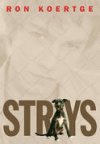Strays by Ron Koertge

Walker Books, 2008. ISBN 9781406316124.
Ted is a teenaged boy who must deal with the death of his parents,
subsequent entry into the world of foster care and life in a new
school as a potential victim. The individuals with whom he interacts
in the context of the drama have often been damaged and hurt by
other people and life itself.
This is by no means a bleak story which dwells upon misery or
abusive themes as so many contemporary narratives do. Instead, the
characters involved in the welfare system and foster care are
realistic in their essentially good intentions but imperfect makeup.
Ted himself is a resilient soul possessing a mature outlook, a
philosophical rationale and the capacity to silently communicate
with animals.
The roles of animals are symbolic of human experiences, ranging
through suffering due to abandonment and neglect to flourishing from
compassion and loving care. It is soon appreciated that Ted is no
Dr. Doolittle but he is a lonely and scared boy who has learned to
seek solace and companionship from animals when humans have failed
him. Anyone who has hugged a friendly dog will understand and
identify with this.
Ted's predicament could reasonably have been the start of a spiral
descending into dysfunction, disengagement and withdrawal from
structured and meaningful life. Instead, the acts of kindness, the
instances of loyalty and the moments of support from his peers
influence this child and provide him with a sense of hope and
fulfillment.
This story is simple and affirming yet I was left feeling
disappointed by the fact that it deserved greater detail and
expansion than is possible in a novel which is pitched at teens who
won't read more than two hundred pages. There is nothing wrong with
this book, however it might have been a great one if Koertge had
allowed his marvellous idea to develop by doing justice to the
narrative and characters. The clipped episodic events and compactly
summarized characters tended not to contribute to a narrative flow
and left me feeling that I was reading a heavily edited version of
the larger story which had been published for less capable readers.
Rob Welsh